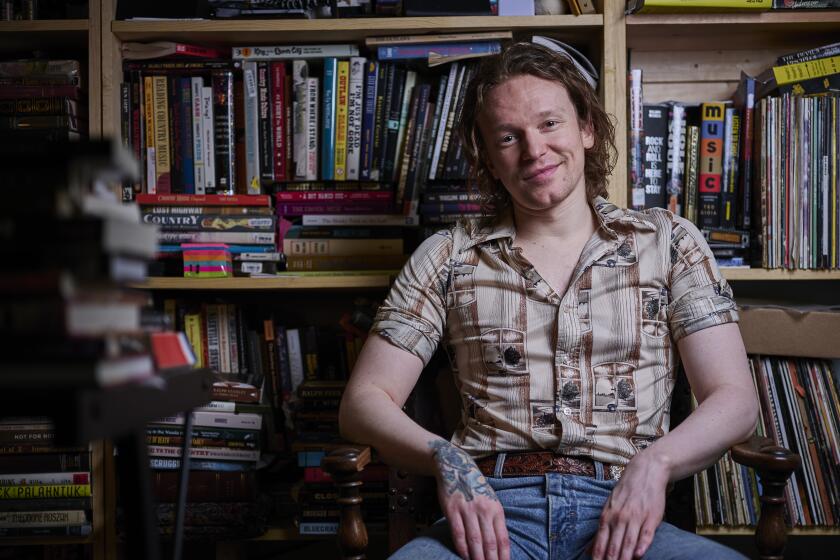Marianne Faithfull and Courtney Love talk romantic poetry, cheating death and the joys of sober sex
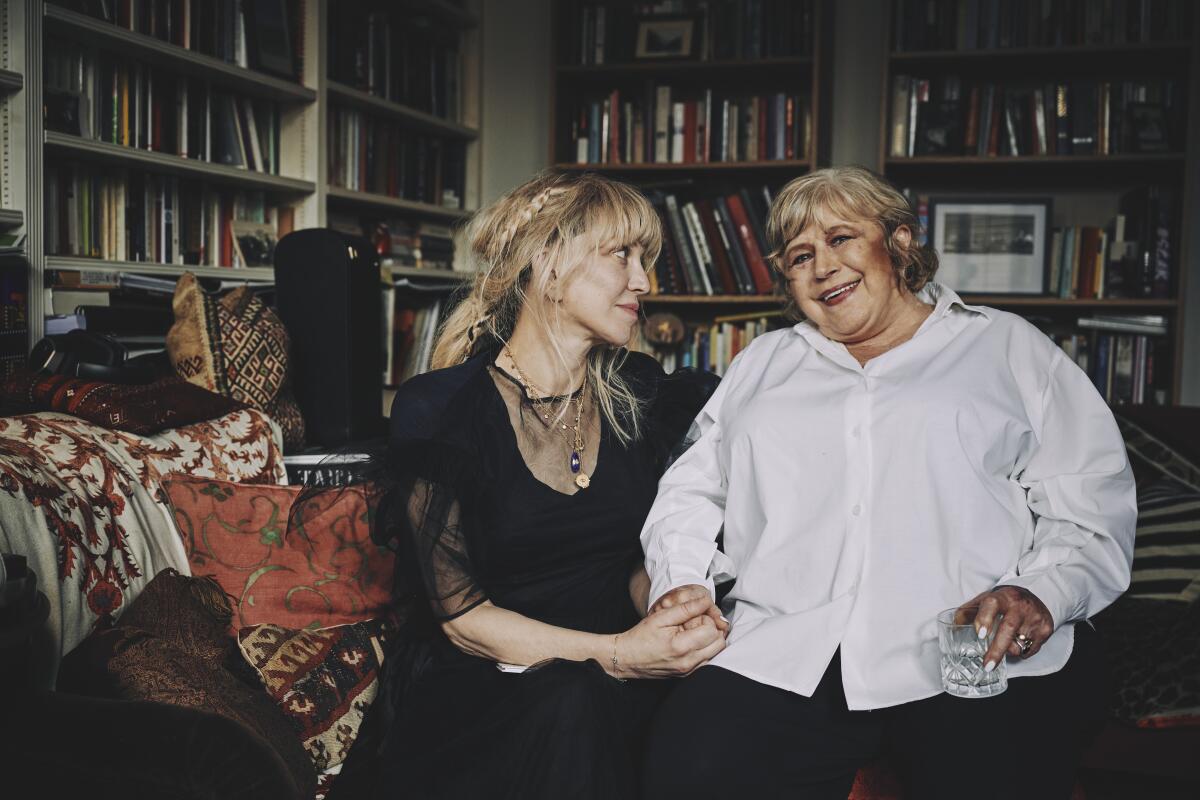
- Share via
Marianne Faithfull and Courtney Love are two of rock music’s great survivors. Both have weathered addiction, rough handling from the media and the music industry and the challenge of establishing their own artistry in the shadow of famous partners: Mick Jagger and Kurt Cobain, respectively.
Yet their origins could hardly be more different. Faithfull, 74, has the regal air of a daughter of English privilege, while Love, 56, has a scrappy, mile-a-minute energy that reflects her chaotic, hardscrabble upbringing and punk-rock adolescence. Friends since the 1990s, they seem both fond and protective of one another when they meet in Faithfull’s west London apartment one April afternoon, surrounded by antique furniture, oil paintings, memorabilia and piles of books.
Faithfull first attained celebrity as a member of the Rolling Stones’ inner circle at the height of their 1960s notoriety — in her hallway hangs a collage of newspaper cuttings from the infamous 1967 Redlands drugs bust of Jagger and Keith Richards, a gift from pop artist Richard Hamilton — but wasn’t taken seriously as a musician in her own right until her 1979 album “Broken English” set her on the path to cult status. Her husky charisma has since made her a magnet for alt-rock mavericks including Nick Cave, PJ Harvey and Beck.
A deluxe reissue of ‘John Lennon / Plastic Ono Band’ details Lennon’s primal scream therapy and the album’s surprisingly playful recording sessions.
Currently experiencing the long-term effects of an almost fatal COVID-19 infection last year, Faithfull uses an oxygen mask to breathe and suffers from chronic fatigue. “So basically I’m f—,” she says. Despite her illness, she has managed to complete her 21st solo album, “She Walks in Beauty,” which features 11 of her favorite 19th-century poems (by Keats, Shelley, Byron) set to music by Cave collaborator Warren Ellis.
Love visited her to talk about poetry, reputation and their mutual friend Hal Willner, a prolific producer who first worked with Faithfull on her 1987 album “Strange Weather” and died from COVID-19 complications in April 2020. “Bono called Marianne in the hospital on Zoom and literally she rose up,” says Love. “She was like, ‘We’re going to do this for Hal.’ And she got better. Dammit, Bono works.”
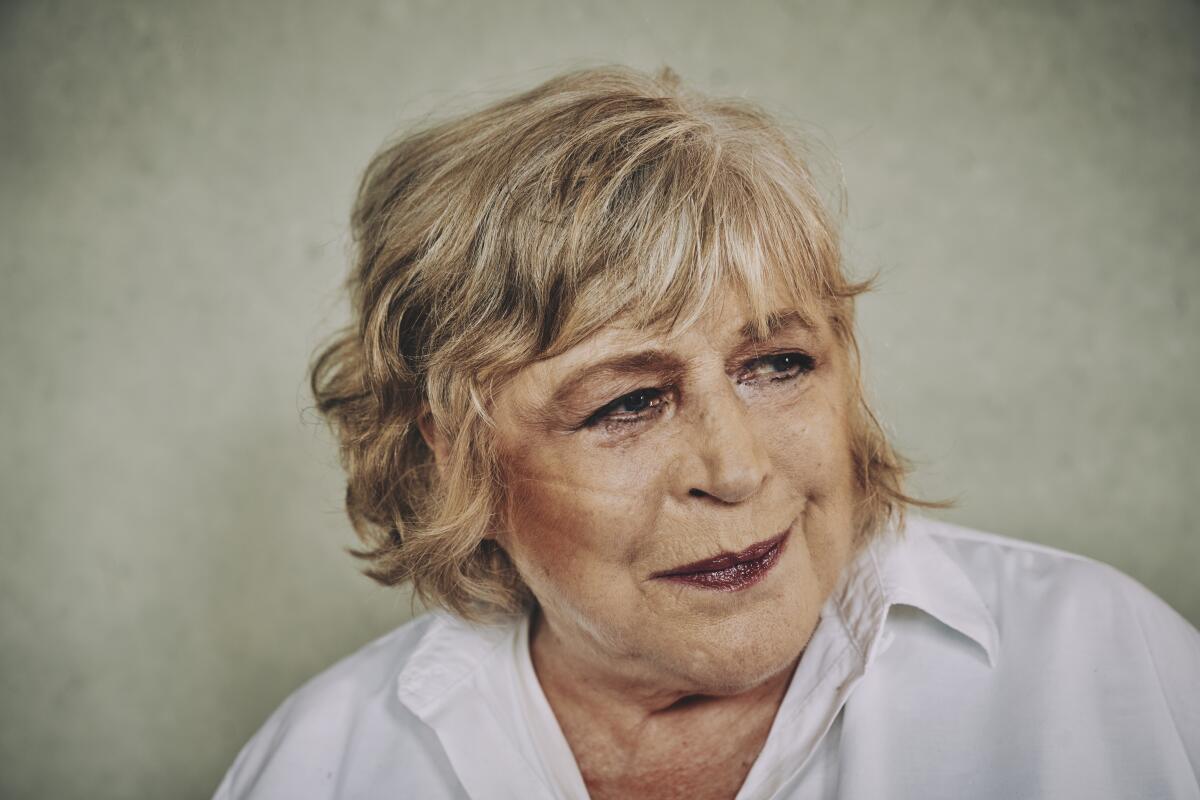
You’re both living in London at the moment…
Love: I’ve been here about 18 months, and I have an artist visa. I’m making my record here. It’s from a village elder point of view: This stuff happened. I would like to buy a house here if I can. I’m not leaving. I don’t like TMZ.
Faithfull: I’m from London. My family are all here, and I have friends here. I came back [from Paris] because [son] Nicholas asked me to, and I realized that he had never got enough of me. I was always somewhere else. I wanted to be more in his life and in my grandchildren’s lives. I’m a lot older than Courtney. It’s time for me to think like that.
How has the last year been for both of you?
Love: I was incredibly sick and I almost died of anemia [unrelated to COVID-19]. It’s a thing. You can die from it. But I started doing what my pain management doctor told me to do and taking CBD oil, and literally my symptoms have reversed.
Faithfull: I began making my album and then I got COVID, and I nearly died. The damage has been very bad. It’s my lungs, my memory and fatigue. It couldn’t be worse. I don’t know if I will ever be able to sing again. I have singing practice once a week, and I’m doing my best, but it’s very hard. I love touring, and it’s breaking my heart that I might possibly not be able to do it again. But I think there are ways around that, like filming. I might be able to do five shows one day: London, Paris, Berlin and two others. But I won’t be able to travel. I’m in Europe and here I’ll stay. That’s OK. I really am European.
Season two of Tyler Mahan Coe’s “Cocaine & Rhinestones” podcast focuses on country great George Jones: “His chest cavity glowed with so much air.”
How did the two of you first meet?
Love: We met in a perfunctory London rock way at [the British music TV show] “Top of the Pops” once, but the real connection, beyond Hal, was one of my very best friends and mentors, and my neighbor for many years: Carrie Fisher. Carrie had this guest house which was always reserved for Marianne. Marianne’s very much royalty in Los Angeles. We did a few things together, you, me and Carrie. Marianne and I are weirdly connected. [But] we can’t stand being compared to each other. It’s ridiculous.
Why do you think you get compared?
Faithfull: God knows why they do these stupid things. I don’t take any notice, and nor must you.
Love: It’s flattering, but it’s also cheap.
Faithfull: It’s a funny way of pushing you down.
Love: It’s the whole great man bull—.
You’ve both had to endure a great deal of misogyny and condescension. Do you ever envy younger female artists who don’t have to put up with that to the same degree?
Faithfull: I always thought that eventually, people would come around and understand women performing and singing and writing. What has happened is what I always thought would happen.
Love: When I was listening to your album, I felt like your whole life is embodied in these poems you’ve read. That’s why I can understand Shelley for the first time. And “The Lady of Shalott” [by Alfred, Lord Tennyson]. I know all the tragic woman imagery around it — I’ve even used some of that imagery myself — but you have read it for me for the first time at 56.
Faithfull: Oh darling, that’s exactly what I want. I want [for] people who didn’t know these poems [to] give them that without being pretentious. Warren Ellis told me that until he heard me read them, he didn’t really understand them and I think that might happen. I hope. It’s a question: What have I got to give now? And at the moment, I have to give this.

You started the album before you got COVID. How did you finish it?
Faithfull: Well, I got better. I didn’t know that I was going to get long-term COVID. I thought I was OK enough. And then [producer] Head and I recorded the second half of “She Walks in Beauty.” You can hear that those pieces are much more vulnerable. The ones I did pre-COVID are stronger. Post-COVID, the one that strikes me is “We’ll Go No More a Roving” [by Lord Byron]. It’s so shaky.
Love: You said this was Byron’s soft side, as opposed to his rock star side.
Faithfull: It’s very sexy.
Love: Oh, yeah. It’s like I went touring with Nine Inch Nails in ’95, and they had two songs every night [“Closer” and “Hurt”] and I thought, “Trent, you’re going to get laid for the rest of your life with those songs.” They were panty-droppers.
When I came over last, and you gave me [your 2018 album] “Negative Capability,” I wanted to ask you to tell me about Keats. [John Keats coined the phrase in 1817.] And it’s like you’ve answered all my questions. “La Belle Dame sans Merci” blew my mind.
Faithfull: The most incredible thing about Keats, Courtney, is that he died at 25, so these beautiful poems were all written before he died. He was a genius.
Love: Tell me about “The Prelude” [by William Wordsworth].
Faithfull: Well, when I was younger and I was studying this stuff at the Convent [St. Joseph’s Convent School, a Catholic girls school west of London], I really didn’t appreciate Wordsworth. I didn’t get him. But now, when I came to do this, I suddenly got it, like light bursting on my face. He’s so f— good. Those poems are composed with such perfection.
Love: I didn’t have a Commonwealth education — I’m Hollywood trash — so I had to learn this stuff on the fly.
Faithfull: Well, you’re doing well.
Love: Remember my friend Lana [Del Rey]? She did a poetry book and someone told me that interest in it helped increase the sales of [Robert] Frost and [Walt] Whitman.
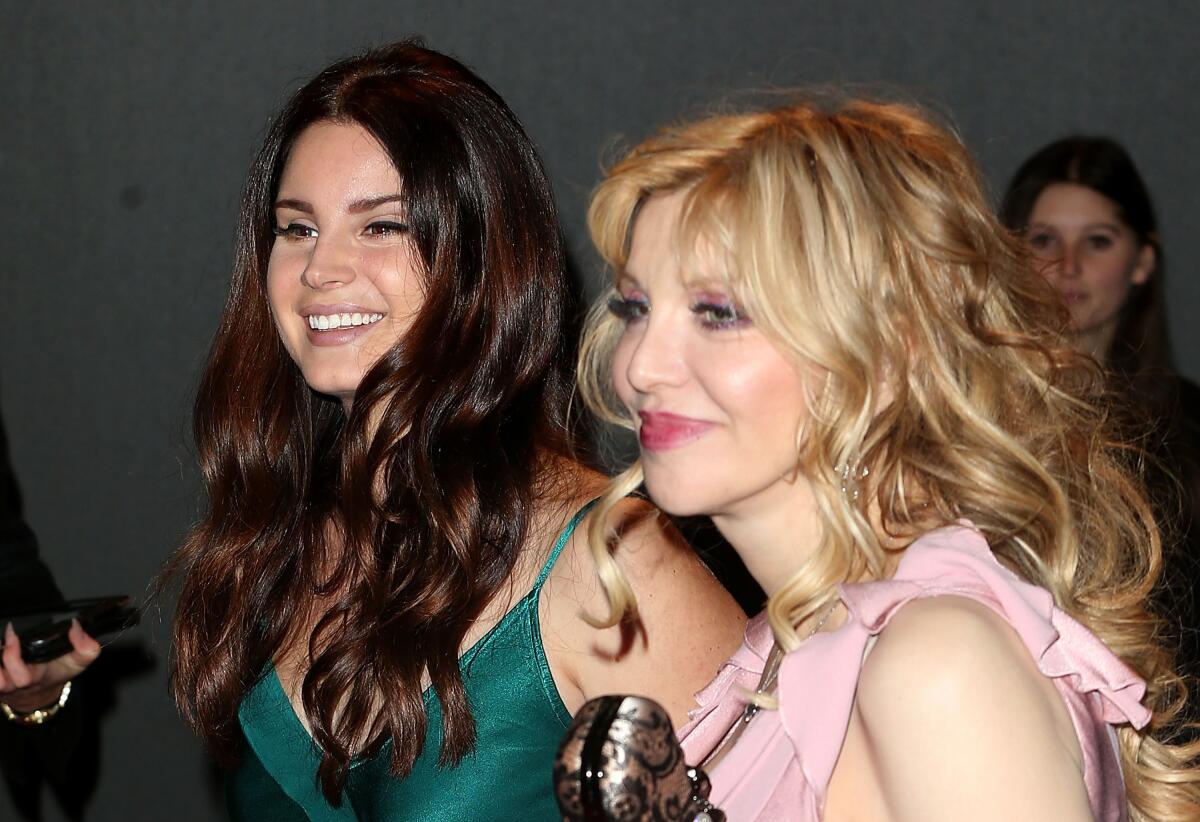
Did you manage to get Marianne into Lana?
Love: No, she wasn’t buying it. She’ll get there.
Faithfull: No, not for me. Sorry.
Love: I looked at the credits on your album and I saw [Brian] Eno, and I was really impressed.
Faithfull: Well, he’s a very dear friend. He did a lot of organ. I didn’t want him to do synth pads, so he had to make that sound from the bottom up, and he did something very beautiful.
Love: And then you have Cave on piano. The kids love that.
Faithfull: Well, I love Nick. But Warren is the one I’m really in love with.
You seem to have been lucky with your friends…
Faithfull: Oh, God, yeah. And I’m still lucky. Keith [Richards] has helped me so much. And Marlon, his son. And Bono. I’ve had a lot of money problems, and they’ve helped me so much. [To Courtney] You’re looking very well.
Love: Thank you. I actually wake up happy every day. It’s crazy.
Faithfull: I can’t believe we did all that: spent so many years taking drugs, smoking cigarettes and drinking. I didn’t get anything out of that except “Sister Morphine” [her 1969 single written by Faithfull, Jagger and Richards]. It was a waste of my time.
Love: It’s weird that guys get something out of their addictions. I got good opportunities but s— songs. Sober songs are so much better.
Faithfull: They really are.
Love: Sober sex, I hadn’t even tried. And then I did and I was like, “Wait, what? This is great.”
Faithfull: And that’s one of the greatest fears we all have getting clean: Oh, my God. I won’t be able to f— anymore. But that is not so. Mind you, I’m so old, I don’t even think about it.
Love: Oh, come on! Your creative drive is born of one of the world’s epic libidos.
Faithfull: [Laughs] Well, that’s where it goes now.
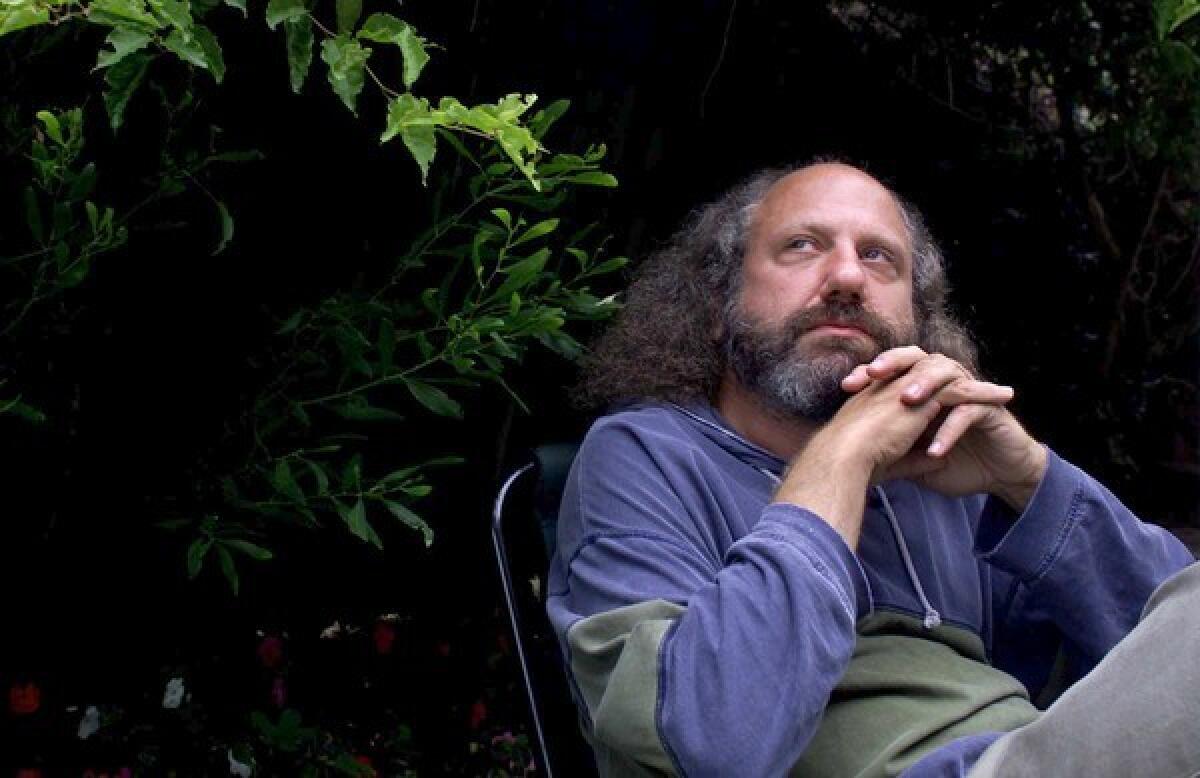
I’d like to ask about Hal Willner’s passing.
Faithfull: I still have not recovered, and I never will.
Love: I remember Marianne was in the hospital and she didn’t know and we didn’t want to tell her.
Faithfull: It happened so quickly. One minute he was alive, and two days later, he was dead.
Love: The last text I have from him says, “I have a headache. I’ll get back to you.” He was so funny and such a tender friend. I made a tribute playlist on Instagram and the cover is you on your motorcycle in black leather [from the 1968 movie “The Girl on a Motorcycle”]. I ended it with the “SNL” horns he orchestrated. [Willner was “Saturday Night Live’s” longtime sketch music supervisor.] I don’t ever want to hear those horns again.

Faithfull: I’m never going back to New York. The only thing I had in New York that I really loved was Hal Willner. He was my best friend. “Broken English” was wonderful, but it wasn’t something I could have done again. I couldn’t have done anything without Hal, actually.
Love: With “Broken English,” you were presented to American kids as this great beauty, now broken, and you never were that. You were always an incredibly classy dame. And Hal knew that.
Faithfull: It was [Island Records founder] Chris Blackwell who saw me as so broken.
Love: And yet you were so insanely beautiful. You always had this class.
Faithfull: Well, I don’t know why, but Chris didn’t dig it.
Love: He wanted broken.
Faithfull: Yes. A lot of people did.
More to Read
The biggest entertainment stories
Get our big stories about Hollywood, film, television, music, arts, culture and more right in your inbox as soon as they publish.
You may occasionally receive promotional content from the Los Angeles Times.
